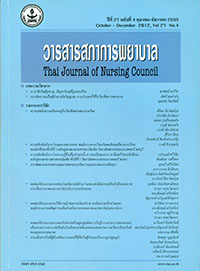การพัฒนาและทดสอบคุณภาพของแบบวัดความรุนแรงของการติดสุรา
Keywords:
คุณลักษณะทางจิต, แบบวัด, ความรุนแรง, ติดสุรา, measurement form, severity, alcoholismAbstract
บทคัดย่อ
วัตถุประสงค์ของการวิจัย เพื่อพัฒนาและทดสอบคุณภาพของแบบวัดความรุนแรง ของการติดสุราฉบับภาษาไทย โดยใช้ข้อคำถามจากต้นฉบับภาษาอังกฤษที่สร้างขึ้นตามแนวคิดของ กลุ่มอาการติดสุราโดยสต๊อคเวล และคณะ วิธีการศึกษาแบ่งเป็น 2 ระยะ คือ ระยะแรกเป็นการแปล เครื่องมือโดยใช้วิธีแปลแบบสมมาตร และแปลย้อนกลับจากภาษาไทยมาเป็นภาษาอังกฤษ ประเมิน ชุดที่แปลย้อนกลับโดยเทียบกับต้นฉบับเจ้าของเครื่องมือ และประเมินความเข้าใจในความหมายและ ความเหมาะสมของภาษาโดยผู้ป่วยโรคติดสุราเพศชายและหญิง จำนวน 4 คน ระยะที่สอง เป็นการ ตรวจสอบคุณภาพของแบบวัด ตรวจสอบความตรงเชิงเนื้อหาโดยผู้ทรงคุณวุฒิ 3 คน ใช้กลุ่มตัวอย่าง ที่เป็นผู้ป่วยติดสุรา 100 คน เพื่อตรวจสอบ (1) คุณภาพของข้อคำถาม (2) ความตรงเชิงโครงสร้าง โดยการใช้กลุ่มต่างและการวิเคราะห์องค์ประกอบ และ (3) ความเชื่อมั่นของเครื่องมือโดยวิธีหาค่า ความสอดคล้องภายใน
ผลการศึกษา แบบวัดความรุนแรงของการติดสุรามีจำนวน 20 ข้อคำถาม คุณภาพของแบบ วัดด้านความตรงเชิงเนื้อหารายข้อมีค่าเท่ากับ 1.00 และความตรงเชิงเนื้อหาของแบบวัดทั้งฉบับมี ค่าเท่ากับ 1.00 คุณภาพของแบบวัดที่ประเมินโดยผู้ป่วยติดสุรา พบว่า (1) ข้อคำถามที่มีความ สัมพันธ์กับคะแนนรวมทั้งฉบับ r ≥ 0.4 มี 20 ข้อ มีอำนาจจำแนกดี 20 ข้อ (2) ความตรงเชิงโครงสร้าง โดยการใช้กลุ่มต่างคือกลุ่มไม่ติดสุรา และกลุ่มติดสุราระดับรุนแรง (กลุ่มละ 33 คน) พบมีความแตก ต่างกันอย่างมีนัยสำคัญ (p < 0.05, t = -20.52) การวิเคราะห์องค์ประกอบได้แบบวัดที่มี 20 ข้อ คำถาม 5 องค์ประกอบ ร้อยละของความแปรปรวนที่สามารถอธิบายได้มีค่าเท่ากับ 73.03 และ (3) สัมประสิทธิ์แอลฟ่าของ ครอนบาค มี ค่าเท่ากั บ 0.92
ข้อเสนอแนะ แบบวัดความรุนแรงของการติดสุรามีความเที่ยงตรงและความเชื่อมั่นในระดับสูงจึ งสามารถใช้เป็นเครื่องมือวัดระดับความรุนแรงของการติดสุรา และใช้เป็นเครื่องมือวิจัยเกี่ยวกับผู้ป่วย ติดสุราได้
คำสำคัญ : คุณลักษณะทางจิต, แบบวัด, ความรุนแรง, ติดสุรา
Abstract
The main objective of this study was to develop a Thai version of an alcoholism severity measurement form and test its quality. The quality-testing questions were translated from the original English-language questions developed by Stockwell et al based on the concept of symptom-based types of alcoholism. This study was conducted in two phases. During the first phase, the questions were symmetrically translated into Thai and then back-translated into English, which was compared with the original to ensure accuracy. The Thai translation was then read and evaluated by 4 male and female alcoholism patients in terms of comprehensibility and stylistic appropriateness. During the second phase, the accuracy of the content of the measurement form was reviewed by three experts using a sample of 100 alcoholism patients. The review focused on: (1) the quality of the questions; (2) structural validity, in relation to different groups and componential analysis; and (3) confidence in the study instruments, by means of internal correlation valuation.
The study revealed 20 questions properly designed for the measurement of alcoholism se-verity. The quality of the item-based content validity measurement was rated 1.00; so was that of the overall content validity measurement. The outcome of the evaluation of the measurement form by the alcoholism patients showed: (1) there were 20 questions with strong discriminatory power, whose scores correlated with those of the entire set of questions, at r ≥ 0.4; (2) the structural valid-ity, as compared with the different groups of non-alcoholics and severe alcoholics (each having 33 members), showed a significant difference (p < 0.05, t = -20.52). Componential analysis applied to the 20-item measurement form based on five components revealed 73.03% of instability; and (3) a Kronbach alpha co-efficient value was 0.92.
It can be recommended based on the findings that the alcoholism severity measurement form, with its proven high accuracy and confidence, may be used to measure the severity of alcoholism and as an instrument for alcoholism-related research.
Keywords : measurement form, severity, alcoholism








